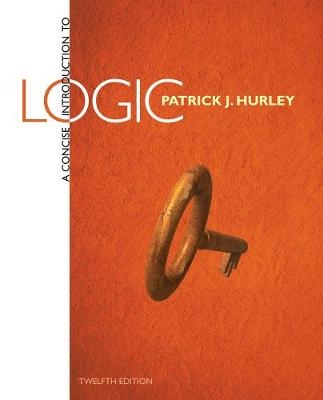
A Concise Introduction to Logic
Wadsworth Publishing Co Inc (Verlag)
978-1-285-19654-1 (ISBN)
- Titel erscheint in neuer Auflage
- Artikel merken
Unsurpassed for its clarity and comprehensiveness, Hurley's A CONCISE INTRODUCTION TO LOGIC is the #1 introductory logic book on the market. In this Twelfth Edition, Hurley continues to build upon the tradition of a lucid, focused, and accessible presentation of the basic subject matter of logic, both formal and informal. The edition's new Previews connect a section's content to real-life scenarios, using everyday examples to "translate" new notions and terms into concepts that readers unfamiliar with the subject matter can relate to. An extensive, carefully sequenced collection of exercises guides readers toward greater proficiency with the skills they are learning.
Patrick Hurley received his bachelor's degree in mathematics (with a second major in philosophy and a minor in physics) from Gonzaga University in 1964 and his Ph.D. in philosophy of science with an emphasis in history of philosophy from Saint Louis University in 1973. In 1972, he began teaching at the University of San Diego, where his courses included logic, philosophy of science, metaphysics, process philosophy and legal ethics. In 1987, he received his J.D. from the University of San Diego, and he is currently a member of the California Bar Association. Retiring from teaching in 2008, Dr. Hurley continues his research and writing, including work on A CONCISE INTRODUCTION TO LOGIC and RELIGION, POWER AND ILLUSION (Prometheus Books, 2022). His interests include music, art, opera, environmental issues, fishing and skiing. He is married to Dr. Linda Peterson, who retired from teaching philosophy at the University of San Diego in 2015.
Part I: INFORMAL LOGIC.
1. Basic Concepts.
Arguments, Premises, and Conclusions. Exercise. Recognizing Arguments. Exercise. Deduction and Induction. Exercise. Validity, Truth, Soundness, Strength, Cogency. Exercise. Argument Forms: Proving Invalidity. Exercise. Extended Arguments. Exercise.
2. Language: Meaning and Definition.
Varieties of Meaning. Exercise. The Intension and Extension of Terms. Exercise. Definitions and Their Purposes. Exercise. Definitional Techniques. Exercise. Criteria for Lexical Definitions. Exercise.
3. Informal Fallacies.
Fallacies in General. Exercise. Fallacies of Relevance. Exercise. Fallacies of Weak Induction. Exercise. Fallacies of Presumption, Ambiguity, and Illicit Transference. Exercise. Fallacies in Ordinary Language. Exercise.
Part II: FORMAL LOGIC.
4. Categorical Propositions.
The Components of Categorical Propositions. Exercise. Quality, Quantity, and Distribution. Exercise. Venn Diagrams and the Modern Square of Opposition. Exercise. Conversion, Obversion, and Contraposition. Exercise. The Traditional Square of Opposition. Exercise. Venn Diagrams and the Traditional Standpoint. Exercise. Translating Ordinary Language Statements into Categorical Form. Exercise.
5. Categorical Syllogisms.
Standard Form, Mood, and Figure. Exercise. Venn Diagrams. Exercise. Rules and Fallacies. Exercise. Reducing the Number of Terms. Exercise. Ordinary Language Arguments. Exercise. Enthymemes. Exercise. Sorites. Exercise.
6. Propositional Logic.
Symbols and Translation. Exercise. Truth Functions. Exercise. Truth Tables for Propositions. Exercise. Truth Tables for Arguments. Exercise. Indirect Truth Tables. Exercise. Argument Forms and Fallacies. Exercise.
7. Natural Deduction in Propositional Logic.
Rules of Implication I. Exercise. Rules of Implication II. Exercise. Rules of Replacement I. Exercise. Rules of Replacement II. Exercise. Conditional Proof. Exercise. Indirect Proof. Exercise. Proving Logical Truths. Exercise.
8. Predicate Logic
Symbols and Translation. Exercise. Using the Rules of Inference. Exercise. Quantifier Negation Rule. Exercise. Conditional and Indirect Proof. Exercise. Proving Invalidity. Exercise. Relational Predicates and Overlapping Quantifiers. Exercise. Identity. Exercise.
Part III: INDUCTIVE LOGIC.
9. Analogy and Legal and Moral Reasoning.
Analogical Reasoning. Legal Reasoning. Moral Reasoning. Exercise.
10. Causality and Mill's Methods.
Cause" and Necessary and Sufficient Conditions. Mill's Five Methods. Mill's Methods and Science. Exercise.
11. Probability.
Theories of Probability. The Probability Calculus. Exercise.
12. Statistical Reasoning.
Evaluating Statistics. Samples. The Meaning of "Average." Dispersion. Graphs and Pictograms. Percentages. Exercise.
13. Hypothetical/Scientific Reasoning.
The Hypothetical Method. Hypothetical Reasoning: Four Examples from Science. The Proof of Hypotheses. The Tentative Acceptance of Hypotheses. Exercise.
14. Science and Superstition.
Distinguishing Between Science and Superstition. Evidentiary Support. Objectivity. Integrity. Concluding Remarks. Exercise.
Answers to Selected Exercises.
Glossary/Index."
| Verlagsort | Belmont, CA |
|---|---|
| Sprache | englisch |
| Maße | 195 x 239 mm |
| Gewicht | 1270 g |
| Themenwelt | Geisteswissenschaften ► Philosophie ► Logik |
| Wirtschaft ► Betriebswirtschaft / Management ► Finanzierung | |
| ISBN-10 | 1-285-19654-6 / 1285196546 |
| ISBN-13 | 978-1-285-19654-1 / 9781285196541 |
| Zustand | Neuware |
| Informationen gemäß Produktsicherheitsverordnung (GPSR) | |
| Haben Sie eine Frage zum Produkt? |
aus dem Bereich


